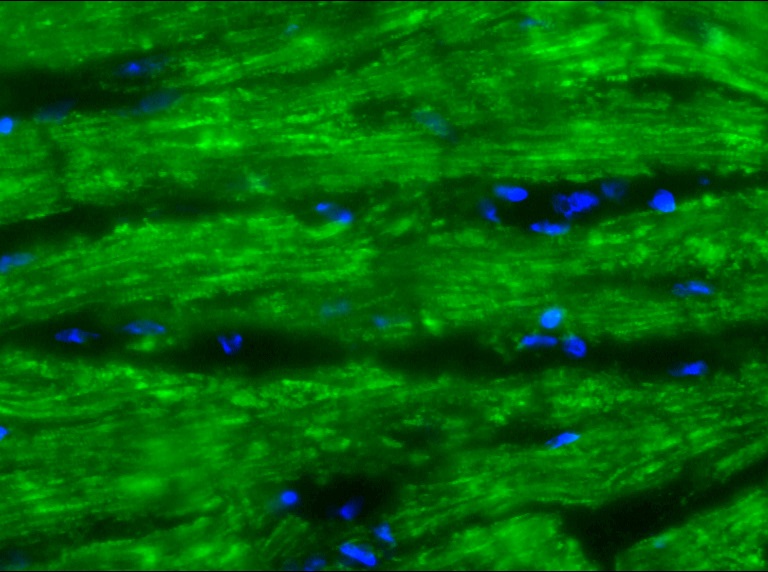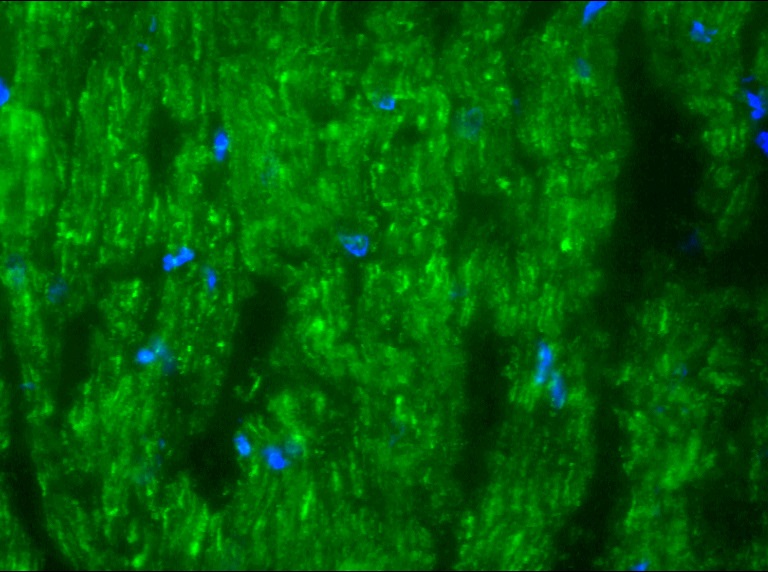Catalogue

Mouse anti Cardiotin
Catalog number: MUB0310P$422.00
Add To Cart| Clone | SR-4 |
| Isotype | IgM |
| Product Type |
Primary Antibodies |
| Units | 0.1 mg |
| Host | Mouse |
| Species Reactivity |
Human Swine |
| Application |
Immunohistochemistry (frozen) Western Blotting |
Background
Cardiotin is a high molecular weight protein complex (300 kDa) loCated in the mitochondria of cardiomyocytes and skeletal muscle. The cardiotin structure exists of subunits of 60 kDa and 100 kDa, probably in a tetrameric configuRation. Both subunits contain the same amino-terminal 14 amino-acid sequence, showing high homology to Human skeletal muscle α-actinin. During cardiac contractile dysfunction and myocard cell differentiation, the cardiotin distribution is affected. Compared to other structural proteins, cardiotin is one of the first to respond to insults (ischemia, fibrillation) that influence the functional status of cardiomyocytes.
Source
SR-4 is a Mouse monoclonal IgM antibody derived by fusion of SP2/0-Ag14 Mouse myeloma cells with spleen cells from a BALB/c Mouse immunized with cardiotin.
Product
Each vial contains 100 ul 1 mg/ml purified monoclonal antibody in PBS containing 0.09% sodium azide.
Formulation: Each vial contains 100 ul 1 mg/ml purified monoclonal antibody in PBS containing 0.09% sodium azide.
Specificity
SR-4 reacts with cardiotin, a mitochondrion-associated protein, which is present in cardiomyocytes and skeletal muscle, but also in epithelial cells and tissues.
Applications
SR-4 is useful for immunohistochemistry on frozen tissue sections and immunoblotting. In immunoblotting assays SR-4 reacts exclusively with the 300 kDa cardiotin protein complex. Optimal antibody dilution should be determined by titration; recommended range is 1:25 – 1:50 for flow cytometry, and for immunohistochemistry with avidin-biotinylated Horseradish peroxidase complex (ABC) as detection reagent, and 1:25 – 1:250 for immunoblotting applications.
Storage
The antibody is shipped at ambient temperature and may be stored at +4°C. For prolonged storage prepare appropriate aliquots and store at or below -20°C. Prior to use, an aliquot is thawed slowly in the dark at ambient temperature, spun down again and used to prepare working dilutions by adding sterile phosphate buffered saline (PBS, pH 7.2). Repeated thawing and freezing should be avoided. Working dilutions should be stored at +4°C, not refrozen, and preferably used the same day. If a slight precipitation occurs upon storage, this should be removed by centrifugation. It will not affect the performance or the concentration of the product.
Caution
This product is intended FOR RESEARCH USE ONLY, and FOR TESTS IN VITRO, not for use in diagnostic or therapeutic procedures involving humans or animals. It may contain hazardous ingredients. Please refer to the Safety Data Sheets (SDS) for additional information and proper handling procedures. Dispose product remainders according to local regulations.This datasheet is as accurate as reasonably achievable, but our company accepts no liability for any inaccuracies or omissions in this information.
Protein Reference(s)
Database Name: UniProt
Accession Number: multiple
Safety Datasheet(s) for this product:
| EA_Sodium Azide |

Figure1. Indirect immunofluorescence staining of cardiotin in swine heart using MUB0310P, clone SR-4, showing localization of mitochondria. Dilution 100x

Figure 2. Indirect immunofluorescence staining of cardiotin in swine heart using MUB0310P, clone SR-4, showing localization of mitochondria. Dilution 100x
